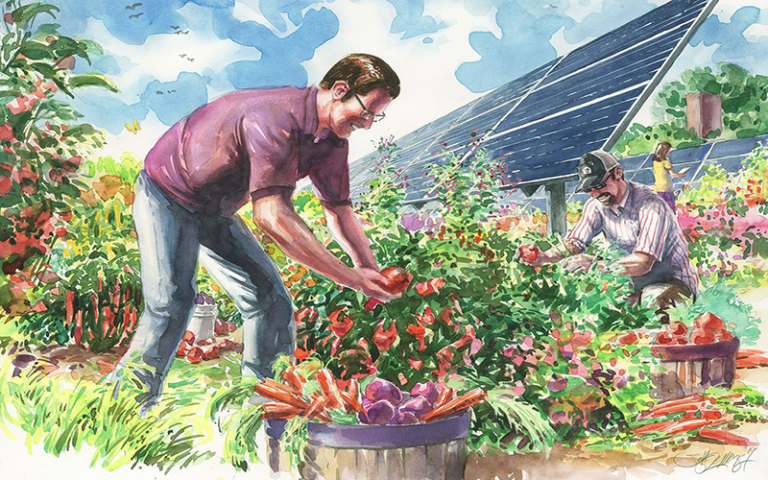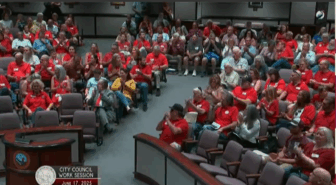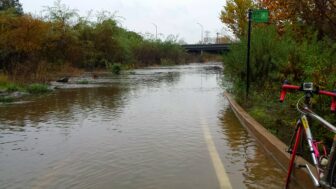I’ve been a climate activist for 20 years in this region. Google Mike Tidwell and “clean energy” and you’ll see what I stand for.
In 20 years, I’ve learned to push aggressively for strong climate policies — but to seek legislative compromise when that’s what it takes to move public policy forward. From the small city council of Takoma Park to the Governor’s office in Richmond to Senate committees in Annapolis to legislative efforts on Capitol Hill, I’m proud to have been part of balanced but ambitious agreements that advance clean energy.
Which is why, as a fellow Montgomery County, MD resident, it pains me to tell you I’ve never seen such a total ABSENCE of compromise – and such a scale of misguided energy policy – quite like the vote that six members of the Montgomery County Council are apparently prepared to make tomorrow. They are about to effectively ban land-based solar power development in our county.
Our County Council is doing amazing work protecting us from the worst impacts of the Covid-19. And I know their intentions are well-meaning on the environment. But the solar vote they are about to make will not only harm our county, it will likely have negative consequences for solar throughout our state and region. I’m not exaggerating. This view is shared by the Montgomery County Sierra Club, the Chesapeake Climate Action Network, and key environmental legislators in Annapolis, including veteran Delegate Kumar Barve who sent the Council this remarkable protest letter last week.
I’m presenting an unusually long argument in this email. So bear with me – if you can — till the end. It’s that important.
Tell MoCo Councilmembers Will Jawando, Gabe Albornoz and others: Don’t land-based ban solar
For the record, the legislators who are on the wrong side of this solar issue and who have resisted a reasonable compromise so far are: Councilmembers Andrew Friedson, Gabe Albornoz, Nancy Navarro, Sidney Katz, Craig Rice, and Will Jawando. The two leaders who probably need to hear from you most are Will Jawando and Gabe Albornoz.
To repeat, our ask of them now is to simply withdraw the amended solar bill. Withdraw it so we can start over and create a lasting and positive solar policy for our county. Meanwhile, the PRO solar councilmembers who’ve already done all they can to achieve a balanced solar policy are Hans Riemer, Evan Glass, and Council President Tom Hucker. Their work is greatly appreciated.
Solar power in the Agricultural Reserve: A controversy?
Chances are you’ve heard something about the idea of placing a limited amount of solar production in the MoCo Agricultural Reserve. Unfortunately, as often happens in public debates, opponents have often been noisier and more extreme in their claims than those of us seeking a truly balanced solution. Indeed, opponents have accused solar companies of greed and “over reach” while saying community solar on farmland would economically harm the farmers themselves, destroy our local food base, and lead to widespread deforestation and harm to the Bay — from solar!! None of this is true. Some critics have even claimed environmental groups like Sierra Club and CCAN are pushing solar for their own financial benefit – which is utterly false.
Now these same critics claim a “compromise” has been reached on the issue. They are asking the MoCo Council to give final passage to the Zoning Text Amendment 20-01 tomorrow. Why? Because that bill, as I mentioned above, has been amended into a de facto ban of land-based solar. Again, I’ve spent 20 years reaching real compromises on clean energy across this region — and this is no compromise. It’s a policy failure.
In the beginning: We had a good solar bill
A good solar policy was in fact proposed last year by MoCo Councilmember Hans Riemer (D-at large). It would have permitted farmers to harvest sunlight on no more than 1800 acres of land in the Ag Reserve (out of 93,000 acres) through a process called “community solar” development. Much of the solar would have benefitted up to 50,000 households, including many low- and moderate-income households and earned nearly $15 million in tax revenue for our cash-strapped county and state. The bill would have allowed a modest 300 megawatts or so of solar. Yet even that modest amount would have lowered total greenhouse gas emissions in the county while lowering the price of electricity for ratepayers and generating a healthy $83 million in local net economic spending. Virtually no tree loss would have been permitted and pollinator-friendly native grasses would have been required to be planted under and around the panels. It was a carefully crafted and balanced compromise bill supported, again, by the County’s two largest environmental groups — Sierra Club and CCAN — and group’s like Poolesville Green and farmers like Doug Boucher.
But on January 26th, this good bill was amended into a bad bill, one that now stands as a de facto ban on land-based solar power. To repeat, the Council Members who voted for one or both of the bad amendments are Friedson, Albernoz, Navarro, Rice, Katz, and Jawando.
Again, I cannot urge you strongly enough to REJECT the claims of council members and others when they tell you this amended solar ZTA is a “compromise.” They’ll tell you the amendments simply ban solar on “class two” soils and subject all solar projects to “conditional use.” But it’s a near-total ban. One MoCo solar company has already announced it will cease operations in the county due to the January 26th amendments vote. The two major regional organizations representing the solar industry have confirmed that their members will find it impossible to build projects in Montgomery County under the ZTA as now amended. Unless the bill is withdrawn tomorrow without final passage, more solar jobs will leave our county and we’ll have almost no chance of meeting our renewable energy goals during a full-blown climate emergency.
Tell MoCo Councilmembers Will Jawando, Gabe Albornoz and others: Don’t land-based ban solar
How did we get here? Clean energy confusion in liberal MoCo
Last week, a WAMU radio reporter wrote that an activist in rural Montgomery County considered solar development an EXISTENTIAL THREAT to the Ag Reserve. The activist wasn’t quoted as saying climate change was an existential threat. There was no mention of sod farming as an existential threat – where topsoil and non-native grasses are peeled off of the land and shipped off to golf courses and suburban homes. (More land in the MoCo Ag Reserve produces sod grass than table food for humans). There was no mention of livestock as a threat, where a majority of the Ag Reserve land is used for raising feed crops for the region’s unsustainable livestock industry, venting net greenhouse gas emissions from most of those acres.
No, the existential threat to the Ag Reserve is apparently solar energy, in the minds of critics. That pretty much sums up the tragically misguided anti-solar movement in our county. Many of the critics of the proposed policy of putting a VERY LIMITED amount of “community solar” production in the AR, will tell you they strongly support clean energy. Some have solar panels on the roofs of their homes. But they don’t want to see farmers harvest solar energy. They describe it as “industrial” solar that will harm the rural character of the reserve. Again, sod farming is apparently okay. Corn fields for pigs are okay. But solar is an existential threat. They want solar in MoCo to be on rooftops and “brownfields” — not as part of a farmer’s mix of operations.
There aren’t enough rooftops and brownfields in MoCo
The problem is there is no way we can reach our county and state clean energy goals with rooftop solar alone or on qualifying brownfield areas left by former industrial sites. These areas are still relatively expensive to develop and, as for stable, non-shaded rooftops, there just aren’t enough qualifying roof areas. We have to put a limited amount of solar on land surfaces. Meanwhile, our farmers are increasingly hammered by extreme floods and droughts from climate change and many of them need the option of harvesting sunlight as a small but supplemental income stream that allows them to hang on to their family farms.
So last year Councilmember Hans Riemer (D-at large) proposed a sensible policy idea. Let’s change the zoning law to allow a very limited – but needed – amount of solar in the Ag Reserve. No more than 2% of the reserve could be solar – and pollinator-friendly native grasses that sequester carbon into soils would have to be planted under and around the solar panels. Better yet, the energy would have to be produced under the state’s “community solar” program with much of it dedicated to low- and moderate-income families. It was a great compromise bill that was passed twice by a joint committee of the MoCo Council.
But then, on January 26th, before the full council, all pretense of compromise was stripped away. The bill was amended into a ban on agricultural solar. Again, council members will tell you it’s not so! The amendments represent a balanced compromise, they say. But years from now when no solar is built and the county loses tens of millions of dollars in taxes and investments, and vulnerable families have no access to cheaper power – and sod farming continues to flourish in the reserve – then we will all will see the solar ban for what it is.
Right now the Council must be persuaded to simply withdraw the bill and start over. If the bill goes forward as is, it will harm more than Montgomery County.
The regional harm of a bad MoCo Council vote on solar
Clean energy has to go somewhere. Tragically, even as sea-level rise accelerates worldwide, the mayor of Ocean City and some business leaders there have strenuously objected to offshore wind power even though the turbines would be tiny images 17 miles offshore. And in western Maryland, land-based wind farms are opposed by some Marylanders even if the windmills are placed on ridgetops already strip-mined for coal and gravel. And now, in Montgomery County, solar is fine as long as it’s not on any farmland.
If the MoCo Council passes the amended solar ZTA, it will set a terrible example for the entire region on clean energy development. If liberal Montgomery County can’t reach a sensible compromise policy, imagine the push back from Republican county and state elected leaders who think climate change is a hoax anyway. Why not ban solar in every rural county in Maryland and Virginia? Clean energy activists like me will be forced to explain the MoCo solar “hypocrisy” every time a clean energy vote comes up anywhere, especially as the years go by and – as intended – no solar farm projects get developed in our environmentally chest-beating county.
This is doubly unfortunate when recent polling shows nearly 70 percent of Montgomery County voters support a balance of solar production on farm land in the county. And, again, by banning such solar, the Council is denying the county badly needed tax revenue and green investments over the next ten years.
Was a ban on solar the goal all along?
Montgomery County Executive Marc Elrich has told me personally that some residents of the Ag Reserve came to him last year and asked him to support a total ban on land-based solar projects in the Reserve. He told them he would not support a ban like that.
Many of those same residents then moved on to the full council, trying to achieve a ban through other means. The January 26th amendments dramatically shrink the amount of qualifying acreage in the Reserve by banning Class Two soils. Then any solar projects that do somehow find a few scraps of qualifying land will be subjected to potentially endless legal challenges through a second passed amendment, one that requires a permitting process called “conditional use.” Again, as we’ve seen above, these amendments are already driving solar investments OUT of our county ahead of a possible final vote on the bill tomorrow.
Does the MoCo Council really care about climate change?
In December 2017, the Council voted unanimously to declare a “climate emergency” and to commit the county to an 80% reduction in greenhouse gas emissions countywide by 2027. Since then, three long years later, the Council has passed no major legislation to actually cut emissions significantly. Only in December did County Executive Marc Elrich release a long-awaited Climate Action Plan, produced by consultants using $400,000 of taxpayer money. Yet the 230-page report itself endorses no specific concrete legislation and sets no specific timelines for meaningful policy implementation. Watch this video.
Honestly, all of this makes voters wonder whether our county government is really serious about climate change at all, even as extreme weather events become more frequent here and nationwide.
Think about it. If we can’t even compromise on land-based solar, then how will we ever eventually pass county legislation banning gas hookups for new homes and buildings while investing real county dollars in electric vehicle infrastructure and all the other things climate scientists say we MUST do in the next ten years?
I wish I could be more optimistic. But right now, things are so bad that the withdrawal of a bad solar ZTA bill would actually constitute a victory in our county. So let’s begin with that.
Tell MoCo Councilmembers Will Jawando, Gabe Albornoz and others: Don’t land-based ban solar
Hopefully, they’ll hear us – and we can actually move forward with the real work that needs to be done to fight climate change right where we live.
Sincerely,
Mike Tidwell
Director, Chesapeake Climate Action Network and CCAN Action Fund





